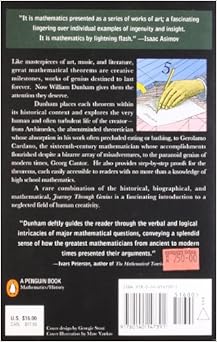Amazon.com Review
In
Journey through Genius, author William Dunham strikes an extraordinary balance between the historical and technical. He devotes each chapter to a principal result of mathematics, such as the solution of the cubic series and the divergence of the harmonic series. Not only does this book tell the stories of the people behind the math, but it also includes discussions and rigorous proofs of the relevant mathematical results.
Review
"An inspired piece of intellectual history."
— Los Angeles Times
“It is mathematics presented as a series of works of art; a fascinating lingering over individual examples of ingenuity and insight. It is mathematics by lightning flash.”
— Isaac Asimov
“Dunham deftly guides the reader through the verbal and logical intricacies of major mathematical questions, conveying a splendid sense of how the greatest mathematicians from ancient to modern times presented their arguments.”
—Ivars Peterson, author of The Mathematical Tourist







